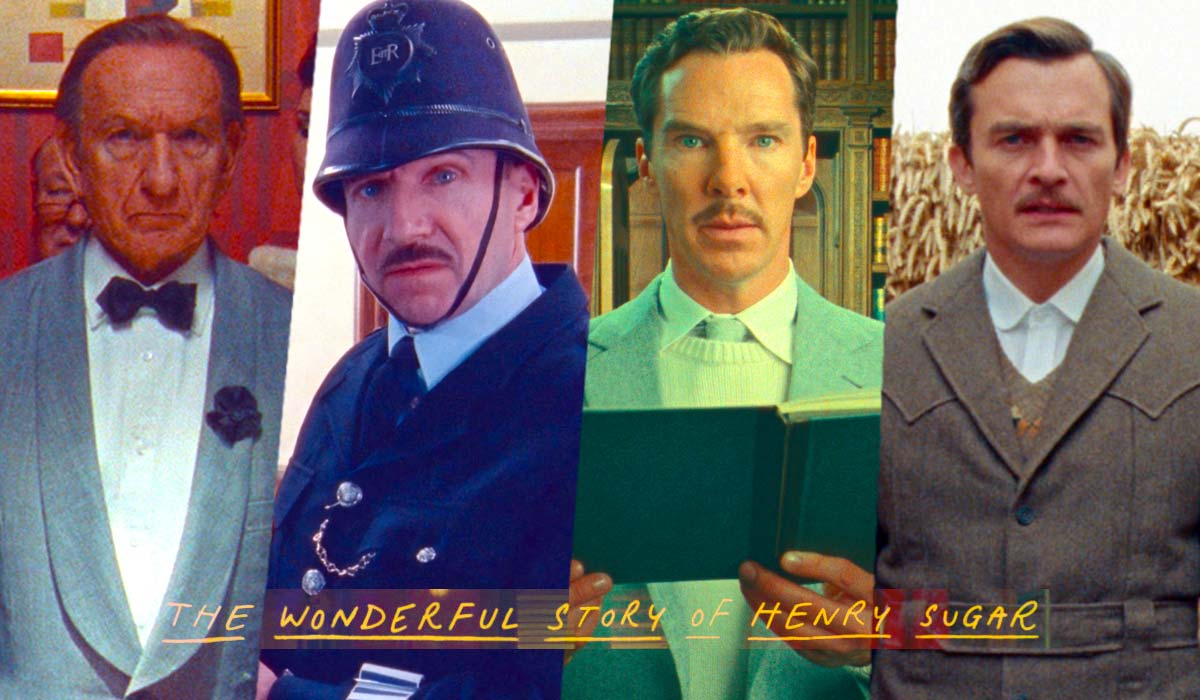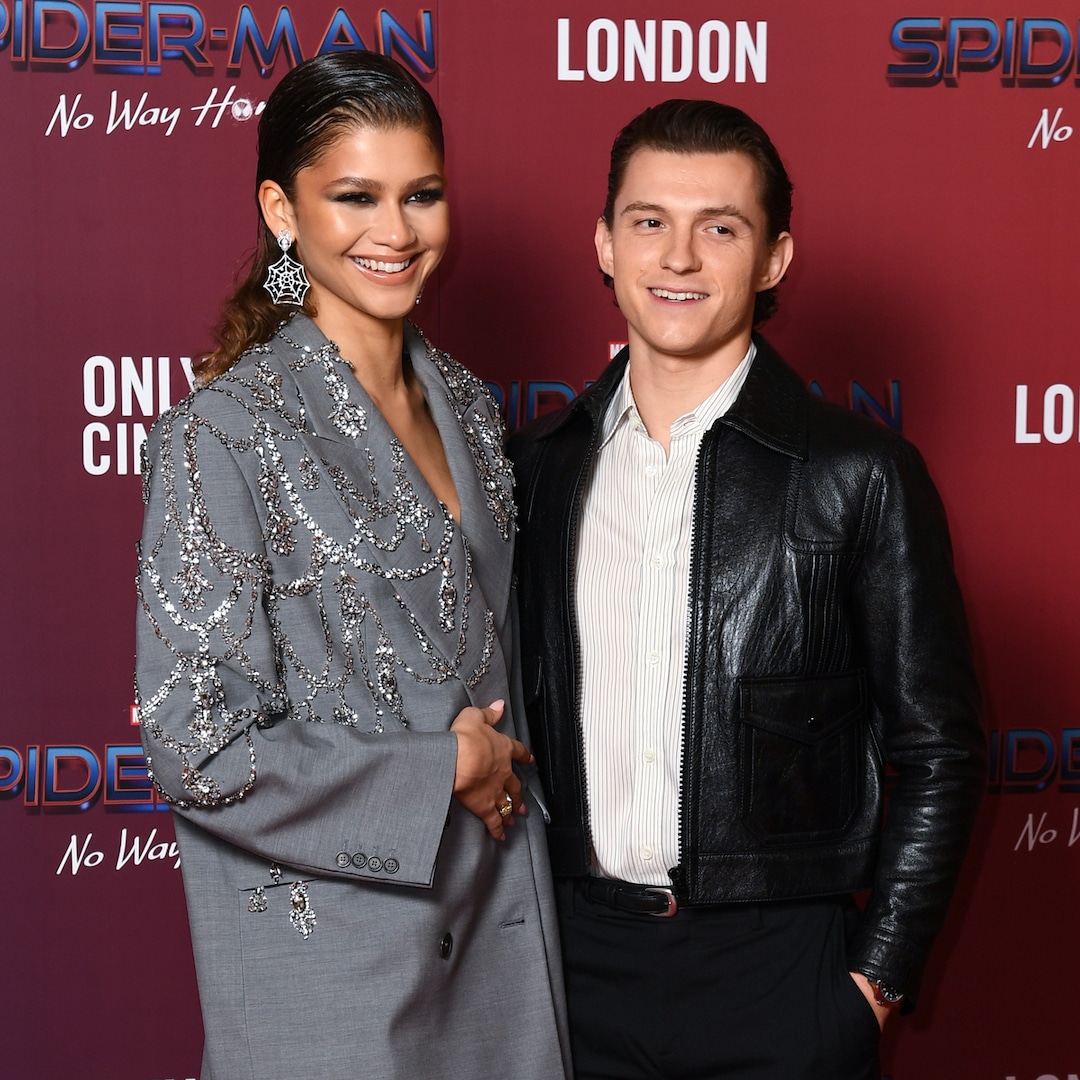
The Preciousness Of Wes Anderson-Isms Are Pushed To Their Artisanally-Crafted Limits [Netflix]
Oct 3, 2023
The artisanally-hand crafted worlds of Wes Anderson are obviously whimsically delicate, precious, often delightful, frequently ornate, and are globally renowned for their visual distinctiveness: precise, symmetrical, soft-hued pastel color-inflected, and rigorous to the point of being lovingly caricatured on social media TikTok videos. Perhaps what isn’t as apparent to the viewer is just how detailed and fastidious Anderson’s screenplays have become in recent years, like prescriptive miniature novels in their own right.
In other words, the written word is really just as important to Anderson’s film, though often overshadowed by his eccentric and idiosyncratic visual style (though he’s been nominated for Best Original Screenplay three times, so someone is paying attention).
READ MORE: ‘The Wonderful Story Of Henry Sugar’ Review: Wes Anderson & Roald Dahl Are A Match Made In Cinema Heaven [Venice]
And so, the four-day Netflix event of Wes Anderson short films based on Roald Dahl short stories that took place this past weekend—“The Wonderful Story of Henry Sugar,” “The Swan,” “The Ratcatcher,” and “Poison”— is something of the ultimate marriage of Wes Andersonisms— meticulous distinct visuals and garrulous, loquacious storytelling come to life. In fact, there’s an apogee of next-leveldom everywhere in the maximalism of it all that curiously and paradoxically embraces minimalism.
Anderson already adapted Dahl’s in the stop-motion feature-length animated film “Fantastic Mr. Fox” (2009), and in many regards, the four “Wes Anderson Netflix Roald Dahl Shorts” (how they will be unofficially regarded here) are akin to the filmmaker trying to take an animated story and realize it in live-action, but almost as if staged in a theater (like a mash-up of all of Anderson’s most recent techniques, especially the stage work of “Asteroid City”)
“Wes Anderson Netflix Roald Dahl Shorts” are literal storytelling come to life: a proscenium stage that often changes baroquely decorative scrim backgrounds in camera—exit stage right, exit stage left!—a fourth-wall-breaking direct address to the audience at all times (from the narrator of each short) that’s both experimental and very familiar, ne plus ultra Wes Anderson. The effect is both transformative and numbing after a while, all the shorts suffering from some of the same overwhelming issues that hurt “Asteroid City”: too much capricious whimsy and artifice gets in the way of heart and soul.
Yet, “Asteroid City” was about loneliness and grief and had a tentative love story at its center—human elements that an audience could relate to next to the extravagant pretense and ones that were built over 90 minutes. Anderson’s four Netflix shorts—90 minutes in total, with each short at 17 minutes minus ‘Henry Sugar’ at 39—don’t benefit from the build of accruing emotion.
Featuring a collection of the same theatrical troupe employed in, more or less, all of the shorts— Ralph Fiennes (playing Roald Dahl himself usually in each one as a kind of anchor), Benedict Cumberbatch, Rupert Friend, Dev Patel, Ben Kingsley, and Richard Ayoade—the shorts are all essentially enchanting, intricate, scrupulously detailed and curiously soulless all at the same time.
You can read our full-length review of “The Wonderful Story of Henry Sugar” here, but here is a quick snapshot of each short.
“The Wonderful Story of Henry Sugar”The best of the four shorts, likely due to its length, Henry Sugar centers on a man (Cumberbatch) who learns about a guru (Kingsley) who can see without using his eyes and then sets out to master the skill in order to cheat at gambling. Essentially about dedication to craft and what one can do when they master something, ‘Henry Sugar’ finds the soul that’s often elusive to this new period of Anderson when the Sugar (Cumberbatch) has a change of heart and realizes he can use his new fortune for good and build a legacy of altruism that need not be immortalized with his name. [B]
“The Swan”Featuring Rupert Friend as the narrator, “The Swan” is perhaps best defined by how it tells a children’s story that is dark and perhaps inappropriate for children, a characteristic that runs throughout much of Anderson’s work that he likely intuited from Dahl. Perhaps it’s just that Anderson has been making Young Adult stories all this time, but YAs modern shape and definition don’t seem suitable to Anderson’s films. Regardless, in it, a small and brilliant boy (Asa Jennings) is mercilessly hounded by two large idiotic bullies. Set in the English countryside with a white background denoting the sky and space, “The Swan” is the most minimalist of the shorts, with elaborate backgrounds of wheat, shrubbery and trees shifting around as the story of ruthless persecutors evolves. It is the saddest and darkest, too, but strangely, it has little effect. [C+]
“The Ratcatcher”Featuring just three actors in this troupe, Rupert Friend as the local man Claud, and Richard Ayoade as an Editor/Reporter, the short is elevated by Ralph Fiennes playing the repulsive Rat Man. “The Ratcatcher” essentially tells the tale of two men (Friend and Ayoade) who call in a professional rodent exterminator to deal with the increasing vermin in their town. What they don’t expect is the vile and yet oddly compelling eccentricity of the Ratcatcher, a foul and repellant man who seems to understand his prey so well he begins to take on their characteristics as he explains gradually—in painstaking detail, of course—on how he dispatches these pests. Dark, nasty, and a little revolting, the Ratcatcher seems to have both an identification and contempt for his subjects. The short itself is, again, something akin for children in theory but a little obscene around the edges thanks to Fiennes’ believably cretinous performance. [B-]
“Poison”The last vignette, “Poison,” in many ways is the simplest—about a man who discovers a poisonous snake asleep in his bed— but taking place at night, it is deceptively complex in its lighting, staging, and camera angles. Cumberbatch plays the man with a lethal serpent asleep on his stomach, and Dev Patel (plays the young man who dispatches a doctor to help (Ben Kingsley). “Poison,” like the other shorts, is initially captivating in its peculiar and theatrically heightened style—there is simply nothing being made at this level, with this attention to detail and care—but it is so stylized, fussy, and painfully exquisite, it starts to drain the color from the viewer and maybe tax his soul. [C+]
Results may vary, but one does get the sense that these shorts are very busy, rat-at-at delivered in the speed of information and detail that they begin to tax and wane the viewer—a whole lot of things happening, like an office full of people running around to and fro, but little essence, heart or emotion to truly involve the viewer who could very well be tuning out.
In fact, to that end, “Wes Anderson Netflix Roald Dahl Shorts” seem like they would be best appreciated by the cinephile audience and not the “what’s up next” Netflix audience that is breezing through the credits for their next piece of automatically playing content to feed the algorithm.
At 90 minutes in length, it is somewhat odd that Netflix did not allow—or the filmmaker didn’t want, we don’t really know— Anderson to build a bookending framework device around the four shorts and will enable them to bundle it as one film and maybe even have one of those limited theatrical releases. And as is, these short stories are curiosities to admire that one wishes would add up to something meaningful (even the infrequent Fiennes as Dahl conceit lends it little centering).
“Wes Anderson Netflix Roald Dahl Shorts” is arguably a make-or-break point for Wes Anderson fans and or Wes Anderson tolerators. The ride-or-die fans will likely be giddy about all the fanciful, fickle, whimsicality of it all. But there’s also an undeniably distancing and alienating element to all the artificial, theatrical, heavily-staged pretense. It’s imagination that’s really off the charts and super inventive on many levels, something to awe and wonder at, marvel at its techniques, but at what cost? One has to wonder if the whirling dervish that has become Wes Anderson movies of late will ever relax and perhaps return to the sweet spot where a high emotional intelligence and resonance dovetails with crafty aesthetic artfulness (“The Grand Budapest Hotel,” “The French Dispatch”). Whether one should get off the spectacular Wes Anderson ride is a matter of personal debate—and hey, who says you even have to choose—but I’d be lying if I said these wonderfully dizzying stories aren’t starting to give me a motion sickness that makes me want to check out. [B-]
Publisher: Source link
Jennifer Lopez Finally Understands Mi Gente Latino Meme
Jennifer Lopez Finally Understands Mi Gente Latino Meme Kicking off 2025, J.Lo is now promoting Unstoppable, a new biography drama in which she stars alongside Moonlight actor Jharrel Jerome. At the 2011 American Music Awards, Jennifer won Favorite Latin Artist…
Jan 11, 2025
Tom Holland's Dad Shares Insight Into Zendaya Engagement
Tom Holland became the greatest showman for his proposal to Zendaya. Just days after the Spider-Man actress turned heads at the 2025 Golden Globes with a 5-carat ring on that finger, Tom's dad... Disclaimer: This story is auto-aggregated by a…
Jan 11, 2025
Aubrey Plaza Issues Statement After Jeff Baena’s Death
The 40-year-old star and Jeff’s family issued a statement to People on Monday, where they called their loss an “unimaginable tragedy.”The Los Angeles County coroner’s office previously determined that Jeff died by suicide in his LA home. He was 47…
Jan 10, 2025
Jill Duggar’s Husband Clarifies Where He Stands With Jim Bob Duggar
Jessa Duggar (m. Ben Seewald)Jim Bob and Michelle's fifth child, Jessa Duggar, was born Nov. 4, 1992. Jessa met Ben through church and he began courting her in 2013—the old-fashioned approach to romance coming as a brand-new notion to a lot…
Jan 10, 2025











